SHE Wins San Joaquin Valley Blueprint Award for Excellence
SHE Wins San Joaquin Valley Blueprint Award for Excellence
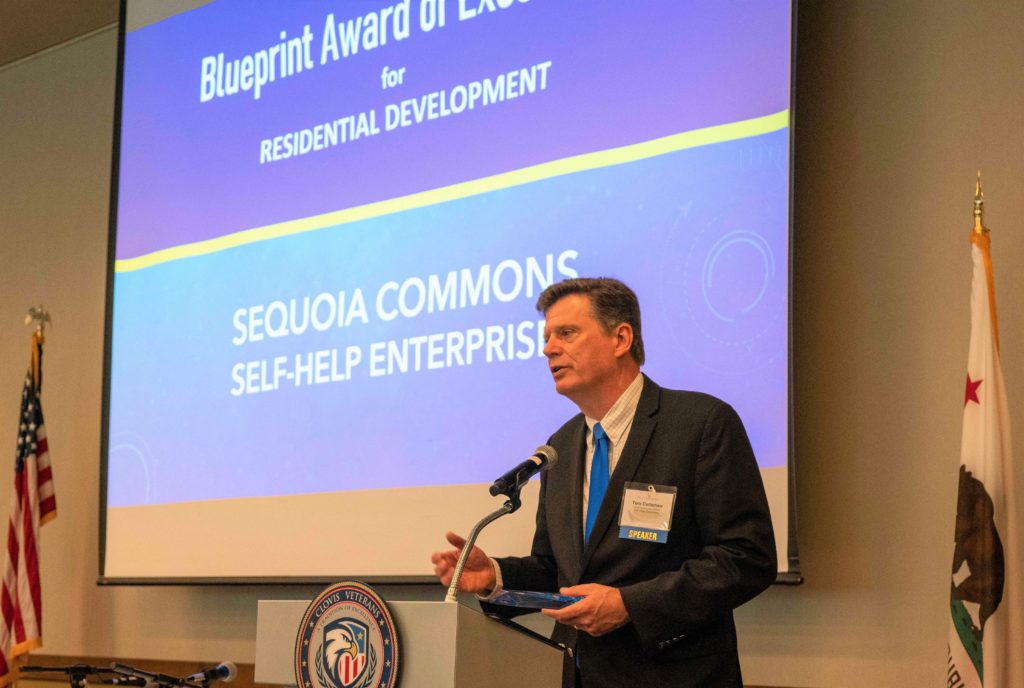
Posted on May 31, 2022
On May 12th, Self-Help Enterprises was awarded the 2022 San Joaquin Valley Blueprint Award of Excellence for Residential Development. This was in recognition of the recently completed Sequoia Commons, a 126-unit multi-family affordable housing development in Goshen, CA.
Sequoia Commons serves households previously experiencing homelessness side by side with seniors and working families to create an enriched and balanced community. The project also prioritized strategic investments in transportation enhancements, environmental sustainability, and land use planning that together result in reduced vehicle miles traveled, reduced greenhouse gas emissions, and greater food equity for the Tulare County community.
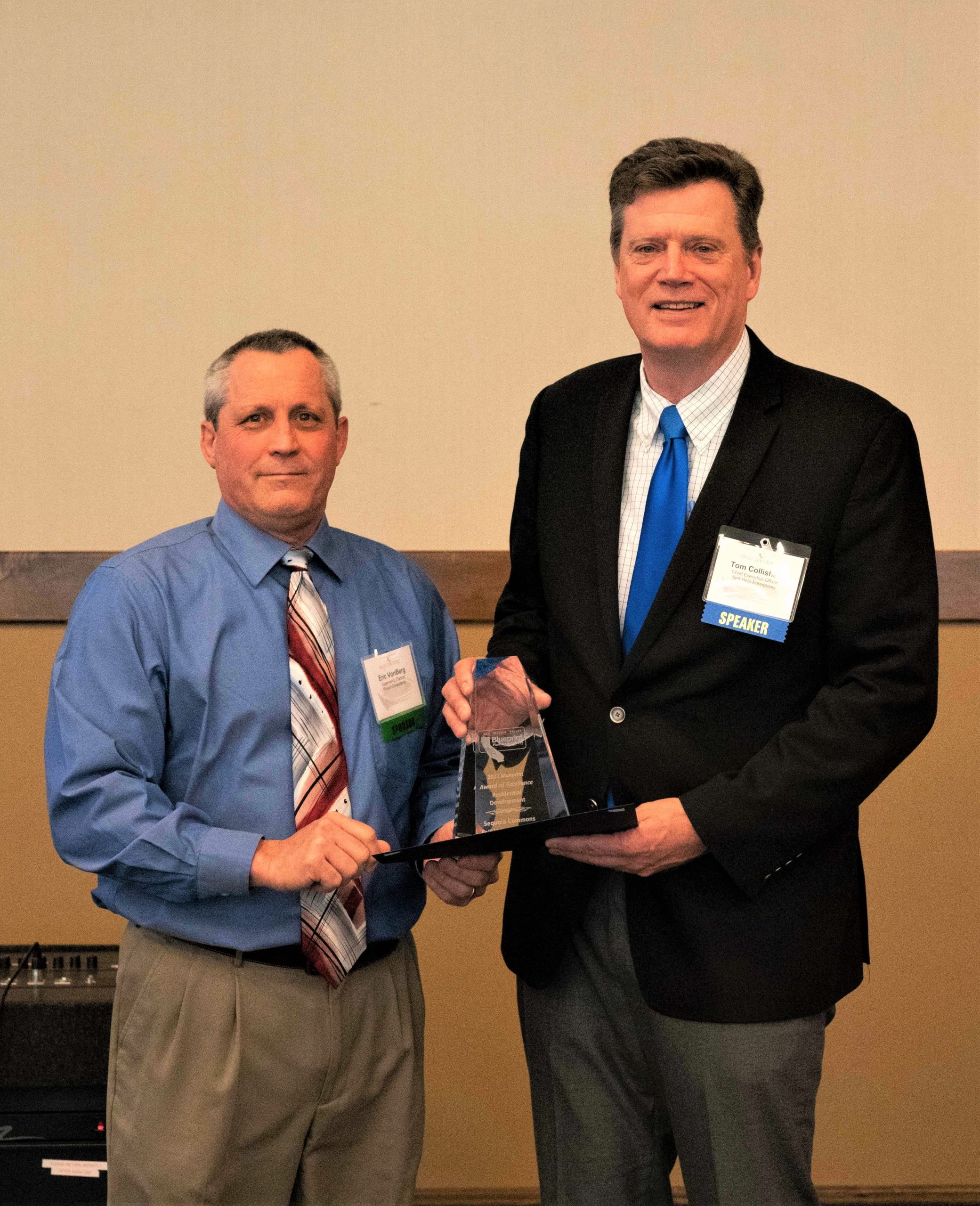
The award was given during the 15th annual San Joaquin Valley Policy Conference, hosted by the Fresno Council of Governments on behalf of the eight Valley planning agencies, including San Joaquin, Stanislaus, Merced, Madera, Fresno, Kings, Tulare, and Kern County. The Conference invites local elected officials, community development directors, and planning organizations to gather to learn about upcoming projects throughout the Valley. This includes recent transportation and housing developments.
The San Joaquin Valley Blueprint Awards program recognizes the outstanding achievements and practices in the built environment that also reflect the Blueprint Principles. These principles are visually represented in the efficient and environmentally conscious projects throughout the San Joaquin Valley. The award nominations were solicited across the Valley focusing on existing projects in the following six categories: Residential Development, Commercial Development, Mixed Use, Downtown Revitalization, Transportation Enhancement, and Historic Revitalization.
Sequoia Commons embraces several of the Blueprint principles. These include:
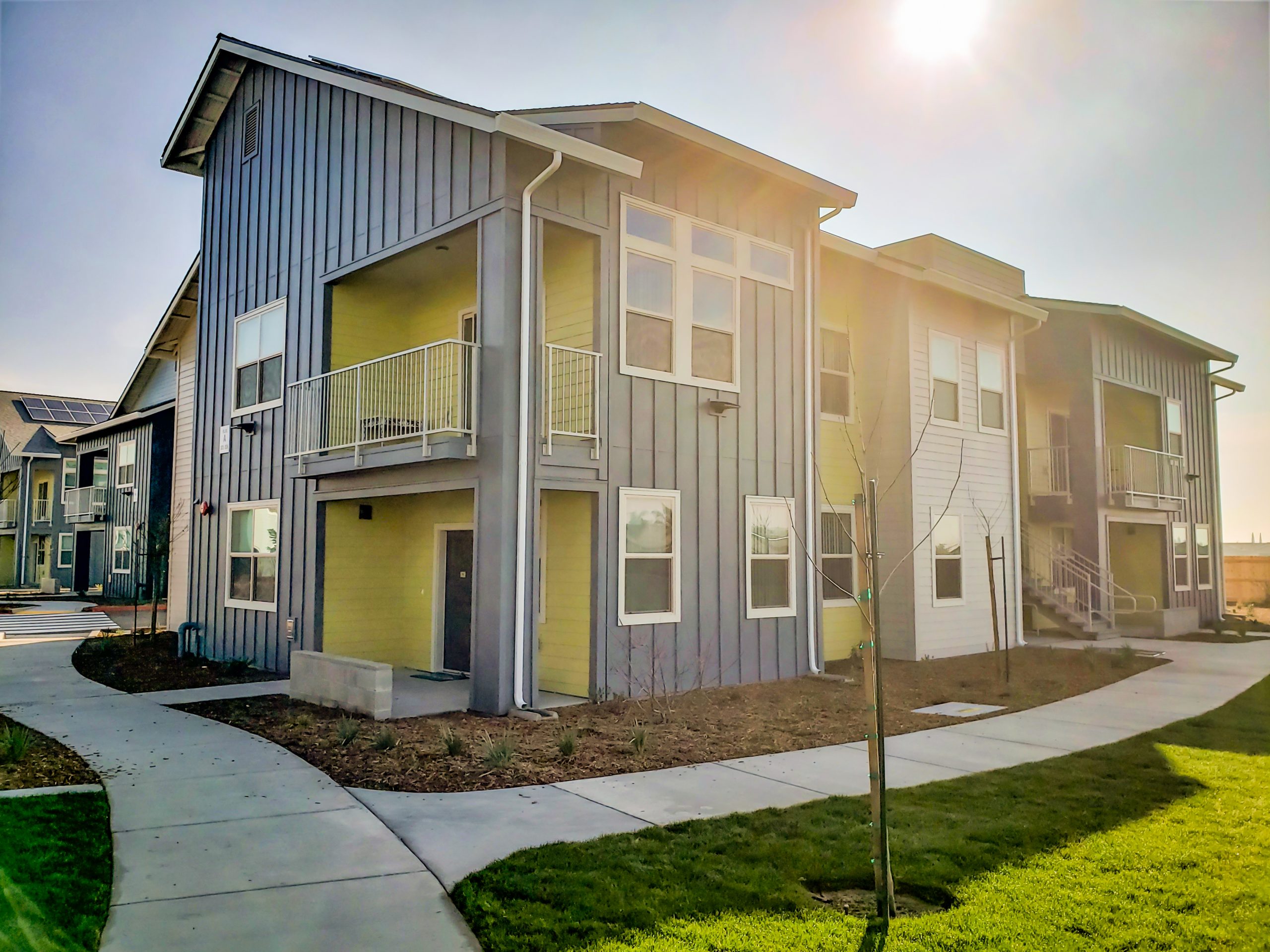
Create a range of housing opportunities and choices
Sequoia Commons provides one, two, and three-bedroom apartments to households with incomes at or below 50% of Area Median Income (AMI). The project also provides housing opportunities for people experiencing homelessness, with 18 units set aside for permanent supportive housing.
Mix of Land Uses
The two phases of Sequoia Commons comprise 5.69 acres of a larger, planned mixed use residential and commercial development area that
will include the construction of 86 mutual self-help single family homes (an additional 16.94 acres) and a proposed grocery store development (5.33 acres). Also included is Neighborhood Village (6 acres), a 52-unit permanent supportive housing project comprised of manufactured homes for people experiencing homelessness that will be managed by local nonprofit organization Salt + Light Works.
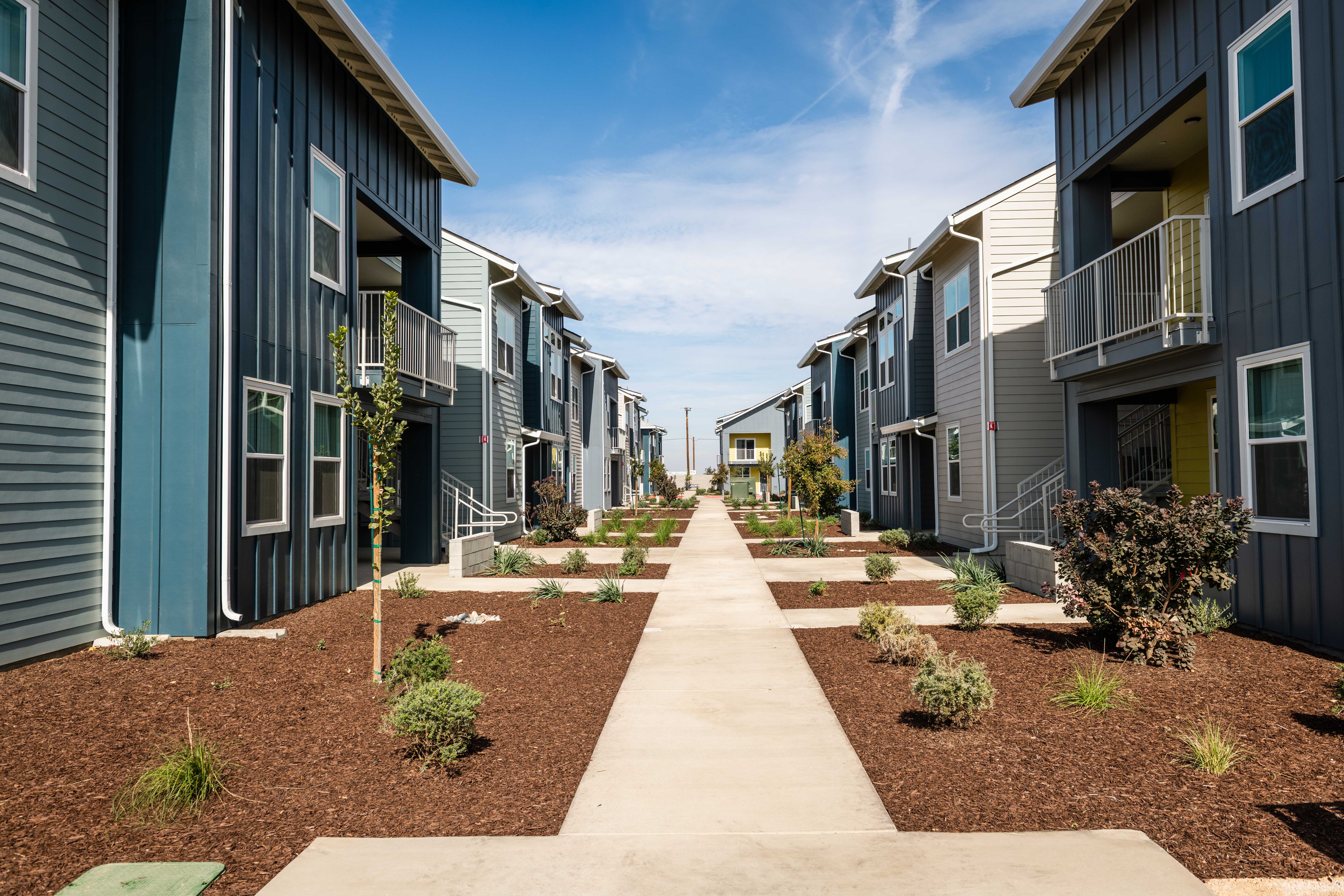
Create walkable and bikeable neighborhoods
As part of the project, SHE added approximately 2,880 linear feet of sidewalks and bike lanes along Riggin Street, Road 76, and interior Street F. When the planned Neighborhood Village, 86 mutual self-help single-family homes, and grocery store are developed, sidewalks and bike lanes will connect to these areas and the existing nearby health clinic, neighborhoods and parks.
Encourage community and stakeholder collaboration
Tulare County Association of Governments (TCAG) provided Greenhouse Gas Reduction Funds which allowed the first phase of development to be competitive and ultimately be awarded Affordable Housing and Sustainable Communities (AHSC) funding. This funding led to collaboration on best active transportation elements to be included in conjunction with the affordable housing.
SHE also worked with the Kings-Tulare Homeless Alliance (KTHA) to design its Permanent Supportive Housing approach at Sequoia Commons and designate 18 units for individuals who are experiencing homelessness. Residents can choose to receive case management and other supportive services through Tulare County Mental Health or local community organizations and can stay as long as they need housing and comply with the lease agreement.
Foster distinctive, attractive communities with a strong sense of place
Sequoia Commons was designed with ample green space, a vibrant on-site community center, and features that make it feel like home. SHE named the community building to honor the legacy of Graciela Martinez, a beloved community advocate who spent a lifetime advocating on behalf of farmworkers and low-income people of the San Joaquin Valley, including many years serving on SHE’s Board of Directors.
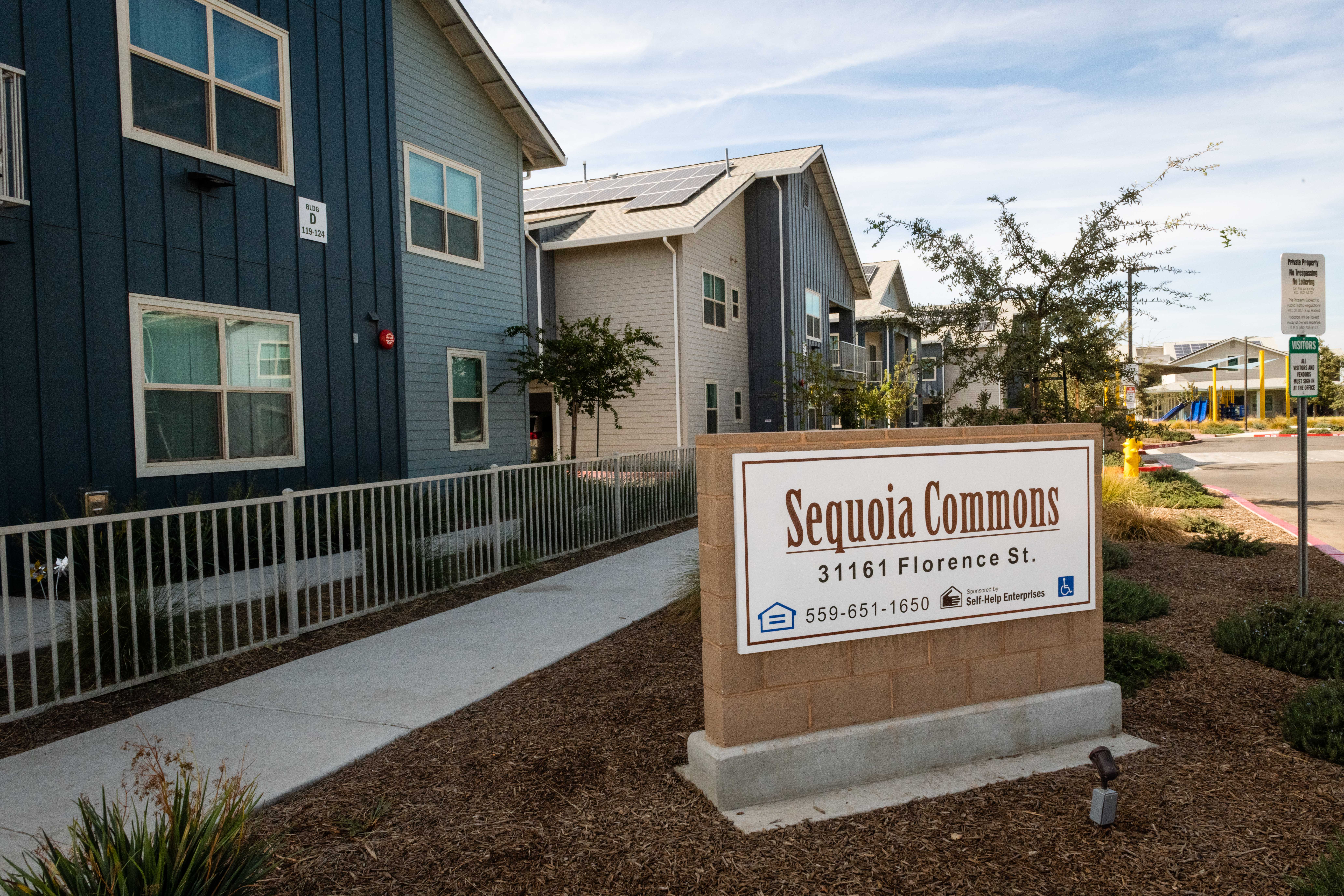 Provide a variety of transportation choices
Provide a variety of transportation choices
With AHSC funding, SHE developed a transit ridership program with Tulare County Area Transit through which SHE purchases transit passes from the County and provides them free of charge to the low-income, working families residing at Sequoia Commons. SHE also implemented a vanpool program through a partnership with California Vanpool Authority, allowing residents without vehicles, or those who wish to save money on transportation, to travel to work together.
Transportation infrastructure improvements included the construction of sidewalks and bike lanes around the project, adding a traffic signal at Road 76, and constructing a new and improved bus stop adjacent to the development.
Support actions that encourage environmental resource management
The project has been designed with passive solar design to maximize natural heating and cooling. Solar PV provides sustainable electricity to common areas and residents’ apartments and makes the project grid neutral zero-net energy.
A variety of water conservation measures have been included, such as low water use fixtures and the use of drought-tolerant plants in the landscape design. These elements combined helped Phases I and II achieve Green Point Rated Gold and Silver, respectively.
The robust transportation support at Sequoia Commons encourages transit and vanpool use, reducing emissions.
Recent Posts
Recent Comments
Archives
- April 2025
- February 2025
- January 2025
- December 2024
- November 2024
- October 2024
- September 2024
- August 2024
- July 2024
- June 2024
- April 2024
- February 2024
- January 2024
- December 2023
- October 2023
- September 2023
- August 2023
- July 2023
- June 2023
- May 2023
- April 2023
- March 2023
- February 2023
- December 2022
- October 2022
- September 2022
- August 2022
- July 2022
- May 2022
- December 2021
- October 2021
- September 2021
- August 2021
- July 2021
- June 2021
- May 2021
- April 2021
- March 2021
- January 2021
- December 2020
- November 2020
- October 2020
- September 2020
- July 2020
- June 2020
- May 2020
- April 2020
- March 2020
- February 2020
- January 2020
- December 2019
- November 2019
- October 2019
- September 2019
- August 2019
- July 2019
- June 2019
- May 2019
- April 2019
- March 2019
- February 2019
- January 2019
- December 2018
- November 2018
- October 2018
- September 2018
- August 2018
- July 2018
- June 2018
- May 2018
- April 2018
- March 2018
- February 2018
- January 2018
- December 2017
- November 2017
- October 2017
- September 2017
- August 2017
- July 2017
- June 2017
- May 2017
- April 2017
- March 2017
- February 2017
- January 2017
- December 2016
- November 2016
- October 2016
- September 2016
- August 2016
- July 2016
- June 2016
- May 2016
- April 2016
- March 2016
- February 2016
- December 2015
- November 2015
- October 2015
- September 2015
- August 2015
- July 2015
- June 2015
- May 2015
- April 2015
- February 2015
